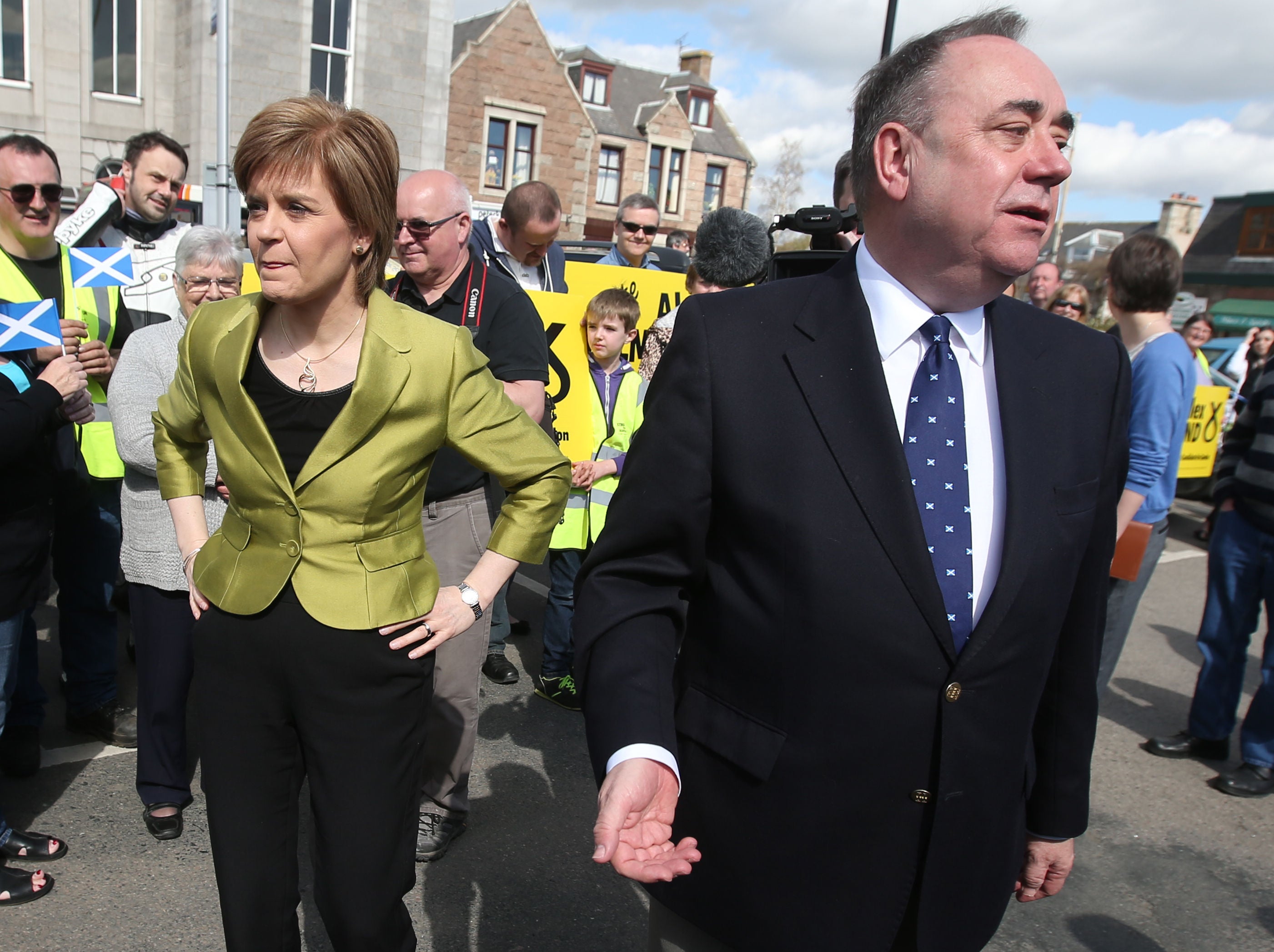Why is the SNP in a state of civil war and will it damage support for Scottish independence?
Internal feuding has erupted following dramatic rupture between Alex Salmond and Nicola Sturgeon

Your support helps us to tell the story
From reproductive rights to climate change to Big Tech, The Independent is on the ground when the story is developing. Whether it's investigating the financials of Elon Musk's pro-Trump PAC or producing our latest documentary, 'The A Word', which shines a light on the American women fighting for reproductive rights, we know how important it is to parse out the facts from the messaging.
At such a critical moment in US history, we need reporters on the ground. Your donation allows us to keep sending journalists to speak to both sides of the story.
The Independent is trusted by Americans across the entire political spectrum. And unlike many other quality news outlets, we choose not to lock Americans out of our reporting and analysis with paywalls. We believe quality journalism should be available to everyone, paid for by those who can afford it.
Your support makes all the difference.The Scottish National Party has been the slickest political machine in the UK over the past decade, moving from plucky outsiders to the natural party of power in Scotland.
Factional turmoil was left to Labour and the Conservatives. The SNP was too busy creating order and harmony in the independence movement, moving the idea of a breakaway Scottish state from a lost cause to an increasingly likely scenario.
Yet internal feuding has finally erupted. There is the dramatic rupture between the party’s two towering figures, current boss Nicola Sturgeon and her predecessor Alex Salmond – the once-close allies who are now sworn enemies.
There is the row over the sacking of MP Joanna Cherry from the Westminster team’s frontbench. And there is a dispute over the timing of the second independence referendum, and how best to play the coming stand-off with the UK government.
So how deep do the divisions go? Can they be healed? And could they damage the party’s push for another independence referendum in the coming year?
Ms Sturgeon will certainly be keeping a close eye on Ms Cherry, who fumed about getting “sacked” from her frontbench role earlier this month. The QC is part of a small group of MPs who have remained loyal to Mr Salmond – insisting that he should have been reinstated by the party after he was cleared of sexual assault charges last year.
It is no coincidence that the Salmond loyalists – Ms Cherry, Kenny MacAskill and Angus MacNeil – are the only SNP MPs without any shadow ministerial portfolio at Westminster.
The rift comes with the added bite of unresolved issues over transgender rights. SNP MP Kirsty Blackman suggested trans people were leaving the SNP because of the behaviour of Ms Cherry and others in the party, saying: “Things have moved on since the 80s.”
Ms Cherry accused Ms Blackman of “lies and smears”, which led to a “vicious threat” to her safety – now subject to a police investigation.
Ms Cherry and some SNP councillors had signed up to a pledge stating that women “have the right to maintain their sex-based protections”. This was perceived as an attempt to work against the party’s plan to make it easier for trans people to gain legal recognition.

The rift widened when SNP MP Neale Hanvey was sacked from his frontbench role as vaccines spokesman after he appeared to back a campaign to sue Ms Blackman.
He was found to have posted a message on a crowdfunder page raising money to bring a defamation action against Ms Blackman and others, saying: “Speak clear and stay strong”.
Neil Mackay, author and columnist at The Herald, says the party is in an “absolute mess” despite being well ahead in the polls for the Holyrood election in May.
“There are multiple schisms at the moment – splits over identity issues, splits along Salmond-Sturgeon lines, and splits along the best path to independence. It’s [a] deeply riven party at the moment. Very dysfunctional and toxic.”
The mess has got messier still over written evidence given by Mr Salmond’s to the Holyrood inquiry examining the Scottish government’s botched handling of harassment claims against him.
The former first minister pulled out of a scheduled appearance at the committee this week after parliamentary authorities redacted parts of his evidence – in which he claimed senior SNP figures around Ms Sturgeon were behind a “malicious and concerted” attempt to bring him down.

Mr Salmond’s lawyers announced that they would be writing to the Lord Advocate to ask for an explanation for the Crown Office’s “astonishing” and “highly irregular” request for the redaction.
The SNP had claimed the inquiry’s decision to publish claims by Mr Salmond could “jeopardise” the anonymity of women who were involved in the legal case against him. However, the inquiry has made clear their anonymity would still be protected.
Ironically, the renewed focus on Mr Salmond – very much yesterday’s man – has become a way of thinking about the future of the party. Many commentators have suggested the treatment of his allies is a worrying sign of autocracy in Edinburgh.
The Telegraph’s union-supporting Scottish editor Alan Cochrane says it shows how the “ruthless lady” at Bute House (Ms Sturgeon) will “tolerate no dissent” from those willing to challenge her leadership.

Mike Small, editor of the influential pro-independence website Bella Caledonia, has no truck with this argument. He suggests the “Cherry faction” at Westminster may wish to consider leaving the party to avoid doing damage to the independence cause.
“It’s all reminiscent of the collapse of the Labour Party in the 1980s or the implosion of the Tory party in recent years,” he notes. “At some point … you either leave because you are convulsed with such rage or you are booted out.”
As intriguing as the Sturgeon-Salmond fight may be, there are far bigger strategic disputes looming over the high-stakes chess match which follows the Holyrood vote this spring.
Ian Blackford, the SNP’s leader at Westminster, recently told The National newspaper that indyref2 “must” be held in 2021. He argued that the Scottish government would be entitled to hold another ballot “quickly” if they win the Holyrood election in May.
There are those demanding Ms Sturgeon declares a “wildcat” referendum if Downing Street refuses to sanction one. Chris McEleny, an SNP councillor with a large online following in the independence movement, has an even more radical “plan B”.
He has argued a majority SNP win in May would be a mandate for Ms Sturgeon to knock on the door of No 10 and demand negotiations over Scottish sovereignty, without any further ballot.
Ms Sturgeon has been as non-committal as possible, saying only that she wished to hold a referendum in the “earlier part of the next Scottish parliament”. Her initial strategy will be to stoke outrage over Boris Johnson’s refusal to grant the vote, sparking a legal battle very likely to end up in the Supreme Court.
Support for a breakaway among Scots has crept up marginally over the past year. There has been a small but consistent majority in favour of independence ever since the pandemic hit early last year. The reality of Brexit was expected to give the independence support another bump at the beginning of 2021.
But as the polling guru Sir John Curtice points out, the average level of support for “Yes” in the latest three independence polls is 53 per cent – down slightly on the 55 per cent recorded during the last three polls of 2020.
The Herald’s Neil Mackay thinks SNP divisions may have something to do with it. “Nicola Sturgeon is perceived by the Scottish public to have handled the pandemic well, so it’s no surprise to find the party ahead in the polls,” he says. “But could support for the SNP and support for independence be even bigger? I think it probably could.”
The commentator adds: “It’s politics 101 that a divided political party isn’t successful, and will tend not to be seen as being good at governance. If it wasn’t as riven by splits, then support for independence could be even higher than it is now.”
Ms Sturgeon and the SNP may well defy political gravity and win a comfortable majority at Holyrood in May. But things may get trickier during the high-stakes constitutional drama to follow.
Wavering Scots will be forced to consider whether the SNP looks like a sovereign government-in-waiting – a permanently superior force to the rabble at Westminster – or just another bunch of squabbling politicians.


Join our commenting forum
Join thought-provoking conversations, follow other Independent readers and see their replies
Comments